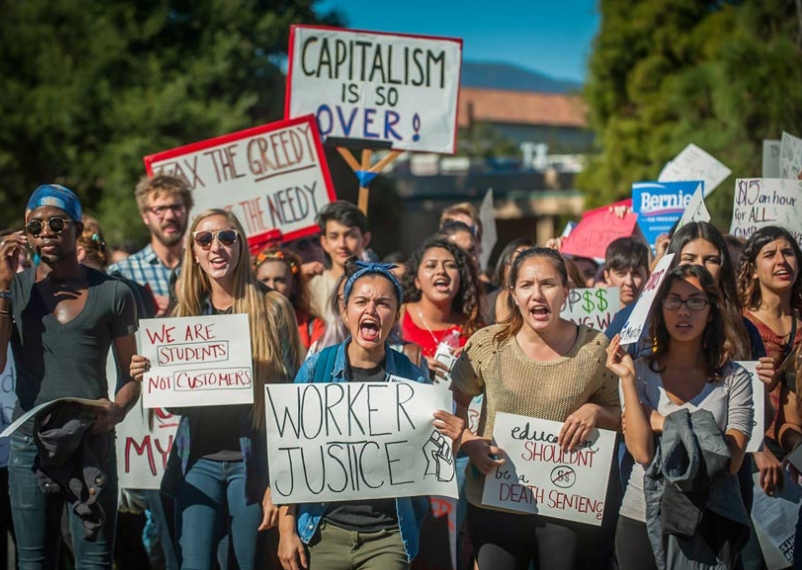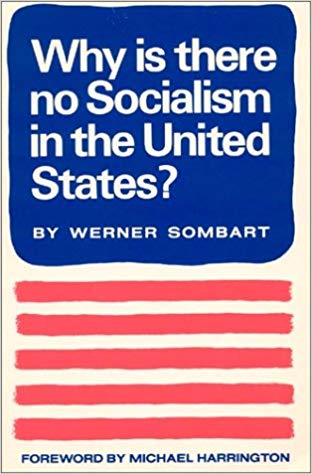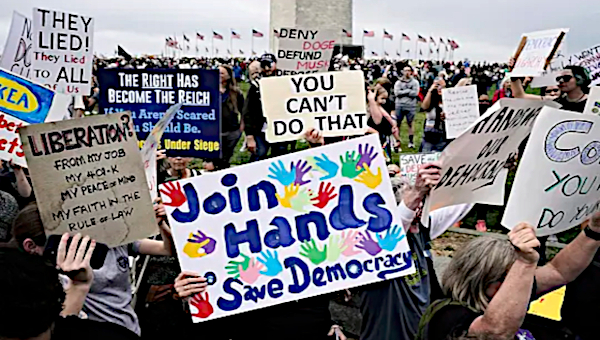Why Is There Now Socialism in the United States?
Today, most people are aware that ‘socialism’ is particularly popular among American millennials. The phenomenon began when the global financial crisis hit. No matter what the design of the empirical research questions that were being asked was, a majority of millennials said they favored “socialism” over “capitalism,” while the older generations, increasing with age, tended to be more pro-capitalist.
 Today, many people understand why this is the case. The millennials, often falsely deemed as post-ideological or a-political, have been the worst-hit by the global financial crisis that started in 2007. A study by the Federal Reserve bank found that low-wage sector jobs accounted for a mere 21 per cent of all jobs lost during the crisis but 59 per cent for all jobs that were created during the so-called “recovery.”
Today, many people understand why this is the case. The millennials, often falsely deemed as post-ideological or a-political, have been the worst-hit by the global financial crisis that started in 2007. A study by the Federal Reserve bank found that low-wage sector jobs accounted for a mere 21 per cent of all jobs lost during the crisis but 59 per cent for all jobs that were created during the so-called “recovery.”
This is the labour market that awaited students coming out of community colleges and universities. According to official numbers by the Bureau of Labor Statistics, in 2013, 753,000 workers in the U.S. fast food industry – where the median annual income is under $18,000 – graduated from college with a bachelor’s degree or higher.
Fresh Elements
These “fresh elements of enlightenment and progress,” as Karl Marx and Frederick Engels called them, that tumbled into the unqualified working class through de-classing, might also help explain the tremendous successes, against all odds, of the mass strikes in the U.S. fast food industry, given that they lack every single kind of structural power of the working class: associational, workplace-bargaining as well as marketplace bargaining power.1
Furthermore, because precarious and involuntary temp work is epidemic, despite Obamacare, 16 per cent of millennials still do not have health insurance, while one in five adults aged 18 to 36 cannot afford routine healthcare expenses and an additional 26 per cent can afford routine healthcare costs, “but with difficulty.”
Given that, unlike in continental European countries, higher education in the United States is not free but costs tuition, students entered this labour market after having gone heavily into debt for their education. Paradoxically, the lack of labour market perspectives runs parallel to an ever-growing burden of student debt, because public universities helped compensate for decreased funding by states constitutionally bound to “balanced budgets” with increased tuition fees.
A study by the Northwestern Mutual Insurance Company, which obviously has an interest in this kind of data, found that, in 2018, 44 million Americans had student loans averaging $33,000, while the average debt of millennials aged 25 to 34 amounted to $42,000 in total. The same study predicted that one in five millennials is expected to die without ever having repaid their student loans.
As a result, millennials are simultaneously more educated than all previous generations and nonetheless poorer than previous generations. According to a recently published Wall Street Journal report, millennial households had an average net worth in 2016 that was almost 40 per cent less than compared to 2001 (Generation X) and about 20 per cent less in comparison to households in 1989. In comparison to previous generations, home ownership among millennials has dropped significantly, from a steady 50 per cent between 1989 and 2001 to merely one third in 2016. As a result, a record 22 per cent of all those aged 25-34 still live with their parents today in the United States.
It is understandable that, given the state of contemporary capitalism, the younger generation of U.S. wage-dependent workers sympathized with and was mobilized by the 2016 presidential campaign of Bernie Sanders.
It is now again on board with his 2020 presidential bid, because Sanders, the self-declared “democratic socialist,” plans to, among other things, undo four decades of bottom-up income redistribution by making college education tuition-free, implementing universal healthcare (“Medicare for All”), a federal $15 minimum wage on top of implementing a Green New Deal, protecting workers who are unionizing from getting fired, and establishing an American version of workers co-determination within private for-profit companies like Wal-Mart etc.
 It is especially clear why his proposals regarding higher education and healthcare are so popular and are perceived as a kind of moral-economy common sense among the young. In short, a generation of workers screwed by the excesses of neoliberal capitalism and climate change is currently turning toward socialism as a result.
It is especially clear why his proposals regarding higher education and healthcare are so popular and are perceived as a kind of moral-economy common sense among the young. In short, a generation of workers screwed by the excesses of neoliberal capitalism and climate change is currently turning toward socialism as a result.
Study after study has shown that the millennial generation today is the most left-leaning generation since the end of World War II, not only with regards to social issues like women’s reproductive rights, gay marriage and gun ownership but also and especially with regards to more purely material and economic issues.
The U.S. may politically have seen a sharp turn to the right with the election of Donald Trump – Republican control of the presidency, most state governorships, the Senate and for a time also the House, plus long-term conservative control of the Supreme Court etc. – but a significant societal shift to the left has taken place especially among the young generation, which also happens to be the largest group among U.S. age cohorts and might impact future American politics in a left perspective.
Socialism and Democracy
Now, as the saying goes, the person who is not a socialist at the age of 20 has no heart but the person who is still a socialist at the age of 40 has no brain, could it therefore be that this is a generational phenomenon that might even be short-term once Trump’s cutting of the corporate tax rate from 39.6 per cent to 20 per cent will, as Trump argued in a speech in Indiana, cause jobs to “start pouring into our country, as companies start competing for American labour and as wages start going up at levels that you haven’t seen in many years”?
Few realize that the conditions described above characterize not merely a generation of workers but the U.S. working class in general, because, without enough demand and without profitable investment opportunities for surplus capital, tax cuts for the wealthy lead to many things such as financial market speculations and Wall Street bubbles, mergers and acquisitions (i.e. job cuts) or uninvested cash reserves like Apple’s $245-billion, but not to job growth, let alone higher living standards for the working class.
This theory has been tried during more than forty years of neoliberalism and has led to nothing but the starkest wealth and income inequality since the Great Depression, as a study by the University of California at Berkeley economists Emmanuel Saez and Gabriel Zucman has shown.2 As a result, not only among millennials but also among the wider population in general, dissatisfaction with capitalism is rising.
And because many more people have realized this and because many ex-Trump voters are now open for a Bernie Sanders alternative, the findings of a new Gallup survey are hardly surprising. According to this survey, the popularity of socialism in the United States is “spiking” and a record 43 per cent of all Americans now believe that “some form of socialism would be a good thing for the country as a whole.”
As Bernie Sanders put it himself when he addressed a festival-sized crowd in Asheville, North Carolina recently, “In the last four years, since I last campaigned here in North Carolina, on major issue after major issue, ideas, which four years ago seemed radical and extreme, are now the ideas that the overwhelming majority of the American people support.”
Interestingly enough, a significant share of the respondents said that they believe that socialism represents the future development for societies worldwide even though the Gallup poll question polemically juxtaposed socialism with democracy instead of with capitalism, as if socialism was anti-democratic instead of the realization and material reinforcement of democracy. Thus, a record 29 per cent responded “socialist” and an additional six per cent “communist” when asked the question “During the next 50 years, do you think most of the nations of the world will have a democratic government, a communist government or a socialist government?”
The first conclusion from this is that socialism in the United States has the potential to grow into a real mass movement. And it is important that we stop for a minute to acknowledge how truly exceptional and historic this is.
Most Anti-Communist Country
This development is happening in the historically most anti-communist country in the world: the country that is most prone to the so called ‘free market’ among the core-capitalist countries.
The country that after World War II seized the role of reinstalling discredited capitalist elites and enforcing capitalist private property in the ‘Grand Area’ of the West, oftentimes with brutal military force against democratically elected socialist governments like the Allende government in Chile in 1973. And the country that safeguarded, with financial, political and military force, the globalization of capitalist social relations across the world after 1989.
A country that is indeed exceptional in the sense that it is the only one among the core-capitalist countries where, despite capitalist development and the emergence of a wage-dependent working class, the historical socialist labour movement never managed to establish a class-based, programmatic mass membership party, but where to this day the old pre-civil war two-party system of classic liberal parties of dignitaries and nobles prevails.
A country where, linguistically speaking, the term socialist is not even part of the political spectrum because ‘liberal’ and ‘conservative’ define ‘left’ (Democratic party) and ‘right’ (Republican party) in the U.S. with ‘moderates’ (swing voters) placed in between. A country where, during the Cold War and the two Red Scares after WW1 and WW2, communists were considered the enemy-within deemed loyal to evil foreign interests and where today only sometimes a ‘progressive’ – i.e. a continental European social democrat – is added to the left end of the political spectrum.
A country where, unlike in continental Europe, the historic attribute ‘social’ does not evoke the historic ‘socialist tradition’ and the historic ‘question sociale’, which emerged as a term in early 19th century France and from there was exported to the Germanic languages in the ‘Vormärz’ prior to the 1848 revolutions, but happens to mean the exact opposite: ‘cultural.’
A country where therefore, once again unlike in continental Europe, a ‘social conservative’ is not a conservative who has turned toward a moderate critique of capitalism and pro-labour reforms from above in order to fend off and co-opt further-reaching revolutionary threats from below, but a conservative who is conservative on ‘cultural’ issues like school prayers or gun ownership etc.
Why Now?
 113 years ago the German sociologist Werner Sombart, a disciple of Max Weber, wrote his famous book Why Is There No Socialism in the United States?, which sought to explain this particular American exceptionalism; his findings have been echoed by U.S. scholars ranging from Eric Foner to Seymour Martin Lipset and his army of disciples. Sombart’s conclusion was that the shortage of labour and the resulting high wage-levels in combination with the ethnic and racial divisions among the working class made socialism in the U.S. powerless. In between the commonwealth of roast beef and apple pie, he argued, there was no room for socialism.3
113 years ago the German sociologist Werner Sombart, a disciple of Max Weber, wrote his famous book Why Is There No Socialism in the United States?, which sought to explain this particular American exceptionalism; his findings have been echoed by U.S. scholars ranging from Eric Foner to Seymour Martin Lipset and his army of disciples. Sombart’s conclusion was that the shortage of labour and the resulting high wage-levels in combination with the ethnic and racial divisions among the working class made socialism in the U.S. powerless. In between the commonwealth of roast beef and apple pie, he argued, there was no room for socialism.3
Today, we can rephrase his question to “Why Is There Now Socialism in the United States?” And the answer is, the relative lack of roast beef and apple pie, i.e. the state of the working class and the real-lived experience of the erosion of the wage-dependent middle classes have created the conditions for a socialist revival, including the tremendous dynamism of the Democratic Socialists of America (DSA) over the course of the past four years.
Of course, given the relative weakness of the U.S. labour movement, socialism is still a long haul. And it remains an open question what kind of socialism is meant by respondents to surveys as well as left-wing politicians like Sanders and Alexandria Ocasio-Cortez. Could a kind of ‘Socialism 2.0’ emerge and prevail without posing the question of private property in the means of production instead of just aiming at dismantling too-big-to-fail corporations, especially when the “natural monopolies” consist of the likes of Facebook, Google, and Amazon. Nevertheless, this socialist revival and resurgence alone is a development of historic proportions and either way will end up in American history books of the future.
Finally, because the United States is an informal empire, an “empire without colonies,” as the Canadian political scientists Leo Panitch and Sam Gindin have called it,4 this development is also changing the world. As the German Marxist philosopher Wolfgang Fritz Haug once argued: To think America is to think the world.5 Although what happens in Vegas may indeed stay in Vegas, what happens in the United States nationally is witnessed and avidly observed by billions of people around the world who tend to know more about the domestic culture and politics of the United States than about that of their immediately neighboring countries. And as revolutions travel across boundaries, as they did in 2011 from the Arab world to Israel and Southern Europe in order to finally arrive in North America as Occupy Wall Street and Canada’s Maple Spring,6 this revolution which is closely observed and analyzed for replication by the outside, will also surely spread to the world. In fact, it already has. •
Endnotes
- See Beverly J. Silver, Forces of Labor, Cambridge University Press, Cambridge et al. 2003, and Ingar Solty, “Die Niedriglohnsektor-Massenstreikbewegung‚ Fight for 15 and a Union!‘: Jungbrunnen der US-Arbeiterbewegung,” in: Junge Welt, 30 April/1 May 2015, pp.12-13.
- Emmanuel Saez and Gabriel Zucman, Wealth Inequality in the United States since 1913: Evidence from Capitalized Income Tax Data, National Bureau of Economic Research Working Paper No. 20625, issued in October 2014, online.
- Werner Sombart, Why Is There No Socialism in the United States?, Palgrave-Macmillan, Basingstoke et al. 1976.
- Leo Panitch and Sam Gindin, “Global Capitalism and American Empire,” in: The New Imperial Challenge: The Socialist Register 2004, Merlin Press, London 2003, p.10.
- Wolfgang Fritz Haug, “Editorial,” in Das Argument 264, Vol. 48, No. 1 (2006), p.3.
- Ingar Solty, “Canada’s Maple Spring,” study by the Rosa Luxemburg Stiftung/New York Office, December 2012.





